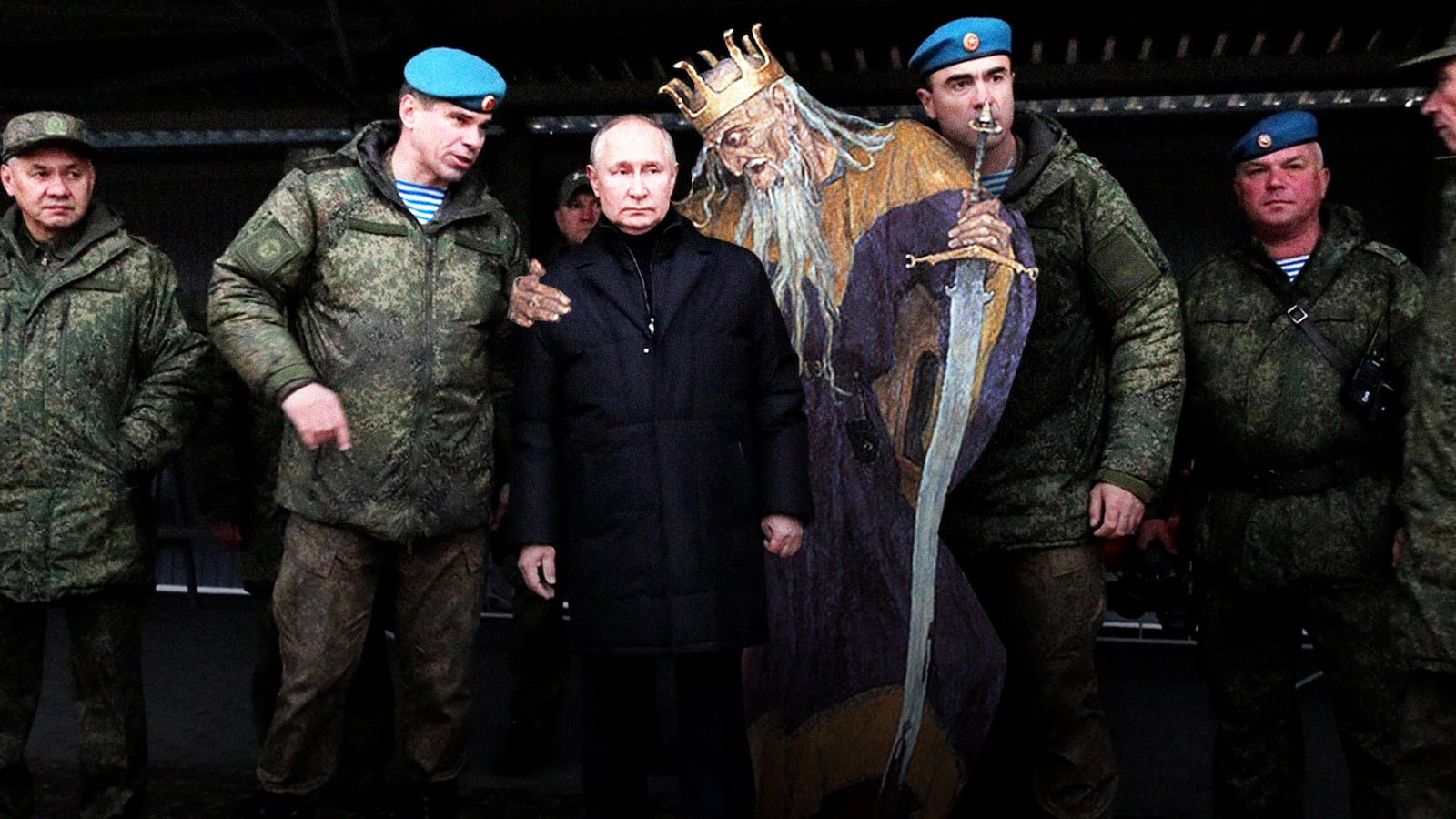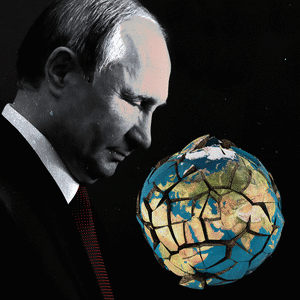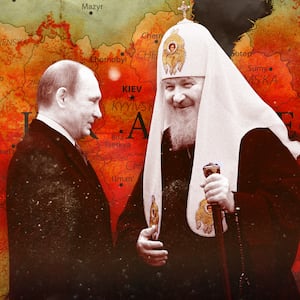If you suspect that Vladimir Putin’s decision-making process is above the creed of superstition and mythical creatures, you should know that there are psychologists, intelligence agency analysts and a jailed Yakutsk wizard out there who would beg to differ.
“Putin and his entourage take the spirit world very seriously,” says a Kremlin official who requested anonymity to ensure his security, navigating what some insiders maintain is the Russian president’s Twilight Zone. “It’s not a big leap of faith for a Russian to think Putin will do what’s necessary to destroy anyone looking to exorcize the imaginary demons who they believe give him power.”
The question is, do you believe that primal evil spirits, concocted to panic delusory serfs, have entranced the 70-year-old Putin into slaughtering Ukrainians and threatening nuclear war against the West?
Anna Moroz, who’s spent a decade counseling Russian emigres mystified about how to accustom themselves to the West’s secular ways, is about as certain of it as any clinical psychologist can be under the circumstances.
“Legendary stories play a formidable role in our national psychology and are without doubt animating Putin’s actions in Ukraine,” the Russian-born Moroz explains, speaking to The Daily Beast under an assumed name for fear of reprisals. “The technical term is paradoxical thinking, but I certainly don’t believe reports that the man-snake Koschei Bessmertny is advising Putin from a grotto beneath the Kremlin.”
Gulp.
But let’s first get a grip on the current geopolitical reality before stepping into another dimension of sight and sound and mind—and Russia’s indigenous Voldemort, who was last spotted assisting Rus’ Grand Prince Vsevolod the Big Nest capture Kyiv in 1203, according to the Tale of Igor’s Campaign.
Russia is a land of riddles Western leaders have spent centuries trying to untangle. The most pressing enigma right now is how to prevent an increasingly isolated Putin from triggering a nuclear holocaust while, at the same time, supplying Ukraine with all the weapons it needs to defeat him without further exacerbating the most vicious and devastating European conflict since World War II.
“It’s like sitting here in 1942 trying to profile Hitler, who also believed in mumbo jumbo,” says a U.S. intelligence analyst who profiles Putin. “You can’t take it seriously, but you must take it into consideration.”
To be sure, Putin is a tsar by vocation, a KGB major by rank and, Moroz says, a “dark trickster” by disposition. “He fits all of Russia’s paranormal stereotypes. Her diagnosis: “Putin is attracted to the idea that supernatural forces anointed him as the Chosen One,” Moroz says.
“Putin hates democracy because he doesn’t believe in human powers,” she adds. “He believes spirits have anointed him with sacred autocratic powers.”
Ethereal or otherwise, the UN Human Rights Council says Putin’s power in Ukraine has so far resulted in his army torturing, raping and executing hundreds of Ukrainian men, women and children.
“Based on the evidence gathered by the Commission,” the UN report reads, “it has concluded that war crimes have been committed in Ukraine.”
An official in one of Russia’s ministries tells The Daily Beast that speculation on whether hocus-pocus is the motivational force behind Putin’s Ukrainian bloodbath is real inside Russia. “He sees the West as weak because it has too many rules that interfere with his power,” the official says. “Ridiculous stories about demons giving him power are nonetheless psychologically concrete. Demons don’t abide by rules.”
A 2016 poll conducted by the All Russia Public Opinion Research Center perhaps best illustrates what a Western profiler described as Putin’s “wraith-like personality.” The survey showed 36 percent of the population believe in supernatural beings, with one in four respondents finding it difficult to answer the question. “Although a relative majority of Russians say they don’t believe in witchcraft,” pollster Ivan Lekonstev concluded, “many are familiar with at least stereotyped and mythological views of it.”
The self-described Siberian “Shaman-Warrior” Sasha Gabyshev claims he’s spent a lifetime struggling against a demonic entity that haunts the Russian president, the fabled Russian villain Koschei Bessmertny—also known as The Immortal and The Walking Skeleton. In the autumn of 2019, the Shaman-Warrior of Yakutia his followers set off on a two-year, 5,000-mile march to Moscow, where Gabyshev vowed to use his magic sword to slay the beast beneath the Kremlin and exorcise its terror from Putin’s soul.
Picking up supporters and news conferences along the way, Gabyshev’s soothsayers were at first attacked by a coven of pro-Putin shamans in the city of Ulan-Ude. Battling on, the sorcerer and his apprentices made it as far as Lake Baikal, where their arrest was televised. Gabyshev was carted off to a mental hospital.
“Putin is scared,” was now jailed opposition leader Alexei Navalny’s response to the mystical melee that put Gabyshev behind bars. “Putin is already stomping his feet and shouting, ‘God save me from this shaman. What if he really does banish me?’”
Moroz says Navalny’s question remains valid. “I’m sure Putin was terrified,” Moroz says. “He staged a major police operation against Gabyshev. The shaman had nothing against Putin. His goal was to remove the demon from beneath the Kremlin and free Putin’s stolen soul. It’s a powerful and accurate metaphor that resonates with all Russians.”
Those who jobwise Putin for Western intelligence agencies are hardly a bunch of humorless stiffs. “But when we stopped laughing,” says one, “we concluded that Putin’s fear of Gabyshev was palpable.”
Still, professional spooks who are skeptical about Russian fairytale characters exerting control over Putin treat the issue with the delicateness of briefing Congress on Santa Claus. “Hard to forecast the result if a significant number of Russians would have gone along with the shaman,” the analyst says. “Gabyshev’s followers attracted many Russians who live far outside the cities, a grassroots movement with a conceivable potential to help destabilize Russia’s consensus that supports Putin’s regime and the war in Ukraine.”
Kremlin-watchers at the Hoover Institution at Stanford University concur. “Putin seems to view Gabyshev as a genuine threat,” said Hoover Research Fellow Dr. Paul Gregory, who’s held visiting teaching posts at Moscow State University and is the former director of the Russian Petroleum Legislation Project at the University of Houston.
Valery Solovey, who’s trained many members of Putin’s ambassadorial corps at the Moscow State Institute of International Relations and served as the prestigious school’s director of public relations, either knows a thing or two about the black arts of Russian diplomacy, or is dafter than a borscht sandwich. As the professor tells it, Putin once commanded Kremlin sorcerers to ritualistically kill a black dog so he could drink the blood to ensure a crushing victory in Ukraine. When that dog didn’t hunt, Solovey claimed that Putin ordered all the magicians’ heads cut off and displayed in front of their homes.
Back in reality, the governor of Russia’s Primorsky region, which includes Vladivostok, last week said between 200,000 and 600,000 men have fled the country to avoid Putin’s war against Ukraine. At the same time, the independent Russian media outlet SOTA reported that police in Moscow and surrounding regions are raiding offices, hostels and restaurants to indiscriminately corral men for mobilization.
Despite the optimistic omens, the deadly matter of whether Putin will launch nuclear weapons remains the biggest unanswered question among Western diplomats and military strategists. Although Ukraine and its allies must brace themselves for the worst, Moroz’s psychological profile of Putin concludes he won’t pull the trigger.
“Like all fairytale demons, Putin will simply vanish, and be replaced by a politburo to solve the hardships of the war in Ukraine,” Moroz reckons. “The arrogant illusion of an all-powerful Russian exceptionalism has been disproved, myth broken. Russia’s leaders must sober up, grow up, and acculturate themselves to the modern world.”








